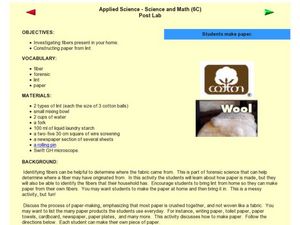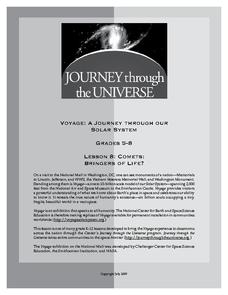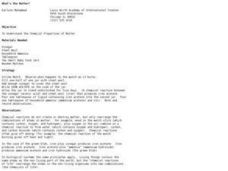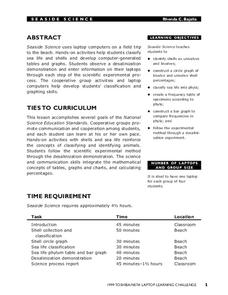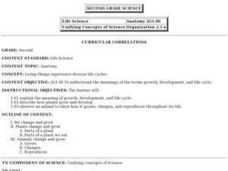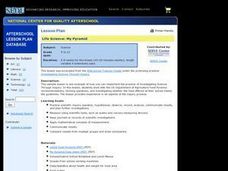Curated OER
Applied Science - Science and Math (Post Lab)
Learners explore science. In this create science lesson plan, students come up with their own science experiment. They use their basic knowledge of hypothesis and procedure to come up with an experiment. This lesson plan includes...
Journey Through the Universe
Comets: Bringers of Life?
Young scientists investigate the elements found in our solar system and then construct a model of a comet. They apply their new knowledge to the formation of the solar system.
NOAA
Ocean Layers I
How is it possible for ocean water to have layers? The sixth installment of a 23-part NOAA Enrichment in Marine sciences and Oceanography (NEMO) program investigates factors that cause different water densities to occur. Experiments...
Earth Day Network
Conserving Water Through Art!
Having fresh, clean drinking water is a privilege many people take for granted. Help raise awareness about the scarcity of water and the importance of conservation by discussing different ways water is used in everyday life. Brainstorm...
University of Minnesota
Manduca sexta: Caterpillar Dissection
Caterpillars have an amazing, yet tough job to perform in their short lives — eat much, avoid predators, and try not to let all those comments about being the unattractive stage of the life cycle get to them. How do they handle it all?...
Curated OER
What's the Matter? (Living and Non-Living Things)
Understand how chemical reactions recombine atoms to create the "chemicals of life". An experiment, showing the basic chemical reactions of an iron nail or a match, helps young children start their understanding of permanent changes.
Purdue University
Getting the Dirt on Decomposition
Sometimes science requires getting a little dirty. A hands-on lesson explores the idea of decomposition by building a compost structure. Using red worms and dirt, individuals build and collect data on the rate of decomposition. The STEM...
Curated OER
Types of Marine Debris
Students conduct an experiment. In this marine debris and environment protection lesson, students categorize trash into piles, predict whether these trash items will sink, float or be picked up and carried by the wind and then test...
Curated OER
Seaside Science
Students research sea life using laptop computers. In this sea life lesson, students participate in a field trip to the beach and enter observations into their laptop computers. Students classify shells and sea life.
Curated OER
Cycles of Life in an Urban Habitat: Changes in Biodiversity
Second graders compare and contrast animate and inanimate objects. In this environmental science lesson, 2nd graders create simple food webs. They observe their environment and create a collage about it.
Curated OER
Life Cycle of Hawaii's Honu
Students simulate the life cycle of Hawaii's Honu. In this Science instructional activity, students act out the life cycle of the Hawaiian sea turtle. Students determine and play the roles of prey and predator.
Curated OER
Butterfly Life Cycle
Second graders explore biology. In this life cycle lesson, 2nd graders act out the stages a caterpillar goes through to become a butterfly. They spend days prior to this lesson observing caterpillars they have collected and developing...
Curated OER
Marine Life Research and Persuasive Conservation Pamphlet
Tenth graders examine conservation and research a type of fish that is under environmental stress. For this conservation lesson students create a pamphlet about the conservation of a marine organism.
Curated OER
Teaching about the Effect of pH on Aquatic Organisms
Students perform experiments to determine the PH, acidity, and buffering qualities of a lake that make them sensitive to acid deposition.
Curated OER
Lab Experiments in Nutrition
Looking for authentic hands-on nutritional experiments? High schoolers will perform experiments to test for the presence of vitamin C in several solutions as well as the effect of caffeine on Daphnia. They will also consider the...
Curated OER
Living Things Experience Diverse Life Cycles
Second graders will study and explain the meaning of growth, development, and life cycle. They describe how plants grow and develop and observe an animal to show how it grows, changes, and reproduces throughout its life.
Curated OER
Marine Habitats of Galveston Island
Four lessons introduce elementary ecologists to salt marsh and sandy beach habitats. In the first activity, they place shells and other materials in vinegar to determine if they contain calcium carbonate. In the second activity, they...
Curated OER
Food & Science - How Healthy is Your Diet?
Learners experiment with various foods to determine fat and starch content. They rub jam, peanut butter, bananas, and other foods in a small circle on a piece of paper, and observe the results. If there is a high fat content in the...
Curated OER
WET Science Lesson #11: How Light Affects Water
Scientists listen to the story of Wadja Egnankou who works to save African mangrove forests. They experiment with refraction and the introduction of particulate matter to water. They conclude with creative writing about the need for a...
Curated OER
Beach Life: Clam Dissection
Young scholars investigate clams. In this clam life lesson, students conduct an experiment where they dissect clams. Young scholars compare anatomies of humans and clams.
Curated OER
Designing a Germination Experiment - Part 1
Learners experiment with seeds and germination. In this natural science lesson, students discuss the stages of germination. Learners engage in a 4 part hands on science activity to view the process of germination.
Curated OER
Life Science: My Pyramid
Students examine how the school food program compares to the food pyramid recommendations. For this food pyramid lesson, students compile data regarding the food choices available in the school through the lunch program and vending...
Virginia Department of Education
A-Mazing Plants
Have your young scientists questioned why plants grow a particular way? Through this learning opportunity, scientists gain firsthand knowledge about how plants develop and various factors that affect rates of growth as they bring plants...
Curated OER
Poetry Through Digital Storytelling
Bring digital storytelling to your language arts class! To begin, learners select their own topic, such as a poem that reflects a life experience they had or a historical figure who interests them. Then they work to create a storyboard...
